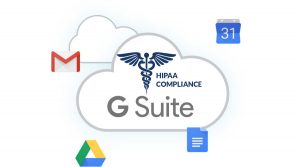A Complete Guide to G Suite HIPAA Compliance IT Security
Many organizations are moving to the cloud with their compliance and regulatory agencies. Moreover, Cloud hosting services provide redundancy and protection, an area where certain businesses that lack. Although, when it comes to HIPAA (Health Insurance Portability and Accountability Act) developed in 1996, more cloud services are lacked and was not ready for HIPAA IT compliance. However, G-Suite has worked more difficult to get one of the few that is not among those providers. So, you need to customize the setup of G Suite for HIPAA compliance. Make sure to read Google implementation guide, G Suite Hipaa Compliance, and Data Protection with the help of Google Applications, to select the appropriate settings. Assuming, the following decisions, as well as settings, are too often neglected. Therefore, in the upcoming section, we are going to discuss the purpose of HIPAA compliance in an Organization and five multiple ways to ensure G Suite is HIPAA compliant using G Suite Backup Utility.
Making G Suite email HIPAA Compliant easy
Google has published a complete guide for making G-Suite services to be HIPAA compliant. An explanation includes the sharing settings for Google Drive and calendars. They highly recommend that users have a strong password with a combination of special symbols, numbers, and upper and lower case letters. In addition, Google suggests a secure password; all end users enable 2-step sign in authentication. To make the G Suite account a bit confusing, here are five different ways to ensure G Suite mail is HIPAA compliant.
1.1. Signed Agreements with Google
Google tries to make service secure as much as possible. Even though, they cannot guarantee the G Suite Hipaa Compliance if there is not having an agreement in place to dictate the need for such account rights and protections. Google Business Associate Agreement covers just few of the application G Suite employs. These applications are allowed by the Personal Health Information (PHI) agreements include:
- Gmail
- Calendar
- Keep
- Google Cloud Search
- Sites
- Vault
- Hangouts Meet
- Drive (including Docs, Sheets, Slides, and Forms)
- Google Hangouts (chat messaging feature only)
At this duration, all business related agreements concerned PHI’s do not cover Google groups, Contacts, or Google+.
1.2. Monitor Access
G Suite Hipaa Compliance is not something that you can turn on or else forget about it. The admin console contains all the reports and logs, allowing you to see at a glance where security risks may exist. Reports will display how an employee may access and share data frequently. This report also determines user collaboration on a particular file, who signs in and analyze the activity of an administration.
To prevent the risk of data loss due to an unauthorized activity, Google creates an alert notification. Even when Google detects activities such as suspended users, new users, or suspicious login, administrators can easily view the attempt. Also, you can set the notifications to make a suspended user “Active” or adding the new user.
1.3. Set Restricted Settings
Google helps to protect HIPAA confidential data or information from their core applications using a signed business associate agreement. While creating a user account, you can perform more by setting restrictive settings. In your Google Drive, turn off the automatic link sharing by selecting an option Specific People to let users allow to view each document. You can give links to control MS Exchange to user Drive or can maintain this control with an administrators only.
G Suite allows an individual to restrict a shared Drive data file further. The sender can choose to have the recipient’s ability to set “view only” permissions rather than edit or comment on that document. Each sender can restrict access with Google accounts.
1.4. Separate Users within the Domain
Most of the companies using G Suite to protect employees who work with sensitive documents from those who do nothing. Different group creation allows an administrator to manage or handle which group has access to a specific Google service. Moreover, small companies are capable to get away with one or two groups, one can handle the HIPAA sensitive information and one does not. The administration can limit those sensitive documents, blocking them from all services like Google+ and YouTube.
A company can create so many groups as they want, protecting employees account further if they select. When the entire HR department may access HIPAA sensitive documents or files, only a small work with those files or documents. You might have HR department as a single group. You can also create another group of those employees when handling confidential information. You can do the same thing with each and every department.
1.5. Create Backup of Sensitive Information
No matter data can be lost or not. When it comes to secure G Suite confidential information, it is more important. You must have online backup service to assist the protection for all of your PHI files.
For this, SysTools G Suite backup can be used to provide backup all the emails between a specific date range. It is capable enough to save or download data from Google Apps along with associated attachments. Moreover, it supports various applications to save calendars and contacts to desktop PC or smartphones respectively. Also, it enables to delete the downloaded emails permanently from the Gmail Server using “delete after download” feature.
G suite backup is the best application, which helps to export G Suite mailbox data to the local drive. In addition, It is strong enough to take entire G Suite backup very easily without any fear of data loss.
Conclusion
In the above discussion, we have covered five different ways to ensure G Suite is HIPAA compliant. Along with this, we have discussed all detail information related to G Suite HIPAA compliance IT security in a proper manner.


